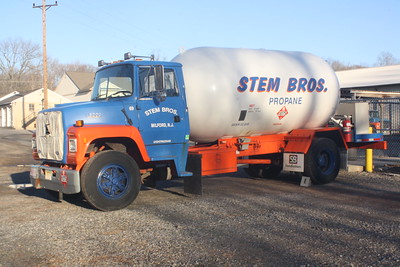
The average cost of propane in Maine as of March 2024 is approximately $3.32 per gallon. This price is a statewide average and may vary depending on the specific location within Maine, the volume of propane purchased, and the provider. It’s also important to note that propane prices can fluctuate due to factors such as supply and demand, seasonal changes, and geopolitical events. Therefore, for the most accurate and up-to-date pricing, it’s recommended to contact local propane suppliers directly.
In the neighboring state of New Hampshire, the price is a little bit lower.
Hover on the line chart below.
Why Do Propane Prices Go Up and Down?
Ever noticed how propane prices seem to have a mind of their own, going up and down when you least expect it? It’s not just your imagination. Several factors can cause these price swings, and understanding them can save you from scratching your head every time you check the latest rates. Let’s break it down into plain language.
1. Weather: The Big Boss of Propane Prices The weather plays a huge role in propane prices. Think about it: when it’s cold, everyone cranks up the heat, leading to more propane being used. This high demand can make prices shoot up. On the flip side, if we’re having a mild winter, not as many people need propane, which can cause prices to drop. So, the weather isn’t just about deciding whether to wear a jacket; it also affects how much you’ll pay for propane.
2. How Much Propane Everybody’s Using Aside from the weather, the overall demand for propane can cause price changes. This isn’t just about heating homes. Propane is used in farming, industrial processes, and even for powering vehicles in some cases. So, if everybody’s using a lot of propane for various reasons, the demand goes up, and yup, so do the prices.
3. Big World Events: The Curveballs World events can throw propane prices for a loop. Conflicts, political tensions, or any significant event that affects oil and natural gas production can also impact propane prices. Propane is often a byproduct of natural gas processing and oil refining, so if something’s going on in the world that affects these industries, you can bet it’ll ripple through to propane prices.
4. Supply and Transportation: The Logistics Game How much propane is available and how easy it is to get it to where it needs to go can also affect prices. If there’s plenty of propane but it’s tough to transport due to, say, bad weather or transportation issues, prices might go up because it’s harder to get it to your tank.
In a nutshell, propane prices are like a seesaw, influenced by how cold or warm it is, how much everyone needs it, what’s happening around the world, and the nitty-gritty of getting propane from point A to point B. Keeping an eye on these factors can give you a heads-up on when prices might hike up or take a dip.
How to Snag the Best Deal on Propane
Feeling lost in the maze of propane prices? You’re not alone. But fear not! Snagging the best deal on propane doesn’t have to be like finding a needle in a haystack. Here’s your down-to-earth guide to making sure you’re not paying more than you need to.
1. Shop Around – It Pays Off Just like you wouldn’t buy the first car you see, don’t settle on the first propane supplier you come across. Prices can vary a lot from one supplier to another. So, what’s the game plan? Hit up a few different suppliers and ask what they’re charging per gallon. Remember, it’s not being nosy; it’s being savvy.
2. Understand the Fine Print Like a Pro Ever signed up for something and then got hit with fees out of the blue? Yeah, we’ve all been there. When you’re chatting with propane suppliers, don’t just nod along. Ask them straight up about any extra charges that might pop up. Delivery fees? Emergency call-out charges? Get the lowdown so you’re not caught off-guard.
3. Keep an Eye Out for Deals and Discounts Who doesn’t love a good bargain? Some suppliers might cut you a deal if you buy a lot of propane at once or if you sign up as a new customer. Don’t be shy to ask if there are any specials that you can take advantage of.
4. The Early Bird Gets the Worm You know how in winter, everything propane-related seems more expensive? That’s because everyone’s scrambling to buy at the same time. Try to fill up your tank before the rush starts. Late summer or early fall is a good time. Prices are usually lower, and you’ll pat yourself on the back when winter rolls around.
5. Read Reviews, but Take Them with a Grain of Salt What are other people saying about the supplier? A quick online search can give you some insights. Just remember, take extreme reviews with a grain of salt. Focus on the overall vibe you get about the company’s reputation.
By keeping these tips in mind, you’ll be in a better position to make a smart choice and save some hard-earned cash on your propane purchases.
How to Budget for Propane Costs
Managing propane costs is an important consideration for homeowners in this state who rely on propane as their primary fuel source. Here are some tips for budgeting for propane costs in Maine:
- Regular maintenance and efficiency upgrades: Regular maintenance of propane appliances and equipment can help ensure that they are operating at peak efficiency, which can help reduce propane usage and costs. Upgrading to newer, more efficient appliances can also help lower propane usage and costs over the long term.
- Comparison shopping for propane suppliers: It’s important to shop around and compare prices from different propane suppliers to find the best deal. Many suppliers offer different pricing plans and delivery options, so it’s important to do your research and choose a supplier that meets your specific needs.
- Budgeting for seasonal fluctuations: Propane prices can fluctuate seasonally, with higher prices during the winter months when demand is higher. It’s important to budget for these seasonal fluctuations by setting aside money during the summer months when prices are typically lower.
- Pre-buying or locking in prices: Some propane suppliers offer pre-buying or price-locking options, which can provide stability and predictability in propane costs over the long term. However, it’s important to carefully consider these options and ensure that they make financial sense for your specific situation.
- Consider alternative fuel sources: While propane can be a cost-effective fuel source, it may not be the best option for all homeowners. Depending on your specific needs and location, other fuel sources such as natural gas, heating oil, or electric heat may be more cost-effective in the long term. It’s important to carefully consider all of your options and compare costs before making a decision.
By following these tips and staying informed about propane prices and trends in Maine, homeowners can better manage their propane costs and budget accordingly.
Factors Affect Outlook for Propane Prices
The future outlook for propane prices is subject to a range of factors that can impact supply, demand, and market trends. While it is difficult to make precise predictions about future propane prices, there are several trends and developments that could have an impact on the cost of propane over time. Here are a few potential factors to consider:
- Shifts in global energy markets: The global market for energy is constantly evolving, and changes in the supply and demand for other energy sources could have an impact on propane prices. For example, increased adoption of renewable energy sources could lead to a decrease in demand for propane, while geopolitical tensions or supply disruptions in other regions could drive up prices.
- Technological advancements: The development of new technologies, such as improved propane storage methods or more efficient propane appliances, could help reduce the overall cost of propane over time. Similarly, advancements in other fuel sources could put pressure on propane suppliers to reduce prices to remain competitive.
- Climate change and extreme weather events: Climate change could impact both the supply and demand for propane. For example, extreme weather events like hurricanes or blizzards could disrupt supply chains or increase demand for propane, driving up prices. Additionally, increasing concerns about the environmental impact of propane and other fossil fuels could lead to increased regulation or taxes on propane use, which could impact pricing.
The outlook for propane prices is uncertain and subject to a range of factors. It is important for consumers to stay informed about trends and developments in the propane industry, and to consider energy efficiency and other cost-saving measures to manage propane costs over time.
Understanding Your Local Propane Prices & How to Compare Costs
Check Local Prices: Start by checking local propane prices in your area. You can contact local propane suppliers or search online for current propane prices. Keep in mind that propane prices can vary depending on your location, the time of year, and other factors.
- Compare Prices: Once you have an idea of local propane prices, compare prices of different propane suppliers in your area. Consider not only the cost per gallon, but also any delivery fees, minimum delivery requirements, and other factors that may affect the overall cost of your propane purchase. You may find that one propane supplier offers a lower price per gallon, but charges additional fees that make the overall cost more expensive than a competitor.
- Understand Price Fluctuations: Propane prices can fluctuate throughout the year, with prices typically higher during the winter months when demand for propane is higher. Understanding these fluctuations can help you plan your propane purchase and avoid paying more than necessary. You may want to consider purchasing propane during the off-season, when prices are typically lower, or budgeting for higher propane costs during the winter months.
- Consider Additional Services: Some propane suppliers offer additional services, such as automatic delivery or maintenance services, that may be worth considering. However, be sure to compare the cost of these services with other propane suppliers to ensure that you are getting the best deal. For example, automatic delivery may be convenient, but it may also come with additional fees.
- Look for Special Offers: Some propane suppliers may offer special promotions or discounts, such as new customer discounts or pre-season pricing. Keep an eye out for these offers and consider taking advantage of them if they fit your needs. However, be sure to read the fine print and understand any restrictions or limitations that may apply.
By understanding your local propane prices and comparing costs, you can make informed decisions about your propane purchase and potentially save money on your propane expenses. It’s important to stay informed and keep an eye on propane prices throughout the year to ensure that you are getting the best deal possible.
Tips for Saving Money on Your Propane Purchase
If you rely on propane for heating your home, water heating, cooking or other applications, there are ways to save money on your propane purchase. Here are some tips:
- Shop Around: It’s important to do your research and compare prices and services of different propane suppliers in your area. You may find that one supplier offers a better price, more flexible delivery options, or better customer service. By shopping around, you can find the best deal and save money on your propane purchase.
- Purchase in Bulk: If you have the space to store a large propane tank, purchasing propane in bulk can be a cost-effective option. Bulk purchases are usually cheaper per gallon compared to smaller, more frequent deliveries. However, keep in mind that this option requires a larger upfront investment.
- Monitor Your Usage: Keeping track of how much propane you use and when can help you plan your propane purchase and avoid running out of propane. This can help you avoid emergency deliveries, which often come with additional fees.
- Consider Energy Efficiency: Upgrading to energy-efficient propane appliances, such as high-efficiency furnaces and water heaters, can help reduce your propane usage and save you money in the long run. While these upgrades may require a larger upfront investment, the savings on your propane bill can make them a worthwhile investment.
- Take Advantage of Payment Options: Some propane suppliers offer flexible payment plans, such as monthly payments or pre-payment plans. These plans can help you manage your propane expenses and avoid large bills during the winter months, when propane usage is typically higher.
- Regular Maintenance: Scheduling regular maintenance for your propane appliances and heating systems can improve their efficiency and prolong their lifespan. This can help you save money on repairs and propane usage over time, as well as ensure that your appliances are running safely and effectively.
By implementing these tips, you can save money on your propane purchase and better manage your propane expenses. It’s important to stay informed and keep an eye on propane prices and usage throughout the year to ensure that you are getting the best deal possible.
To Make a Conclusion
The price of propane in Maine can fluctuate depending on a variety of factors, including supply and demand, weather conditions, and transportation costs. It’s important for consumers to stay informed about local propane prices and to compare costs among different propane suppliers to ensure that they are getting the best deal possible.
By budgeting for propane costs, considering additional services, and looking for special offers, consumers can potentially save money on their propane expenses. While the future outlook for propane prices in Maine is uncertain, by staying informed and making informed decisions, consumers can better manage their propane costs and ensure that they are getting the best value for their money.

Mike is an experienced propane technician with over 15 years of professional experience in the field. He has dedicated his career to helping customers with their propane needs, from installation to maintenance and repair. Together with Jeremy, he co-founded this website to provide useful information and guidance to customers seeking reliable propane services.



